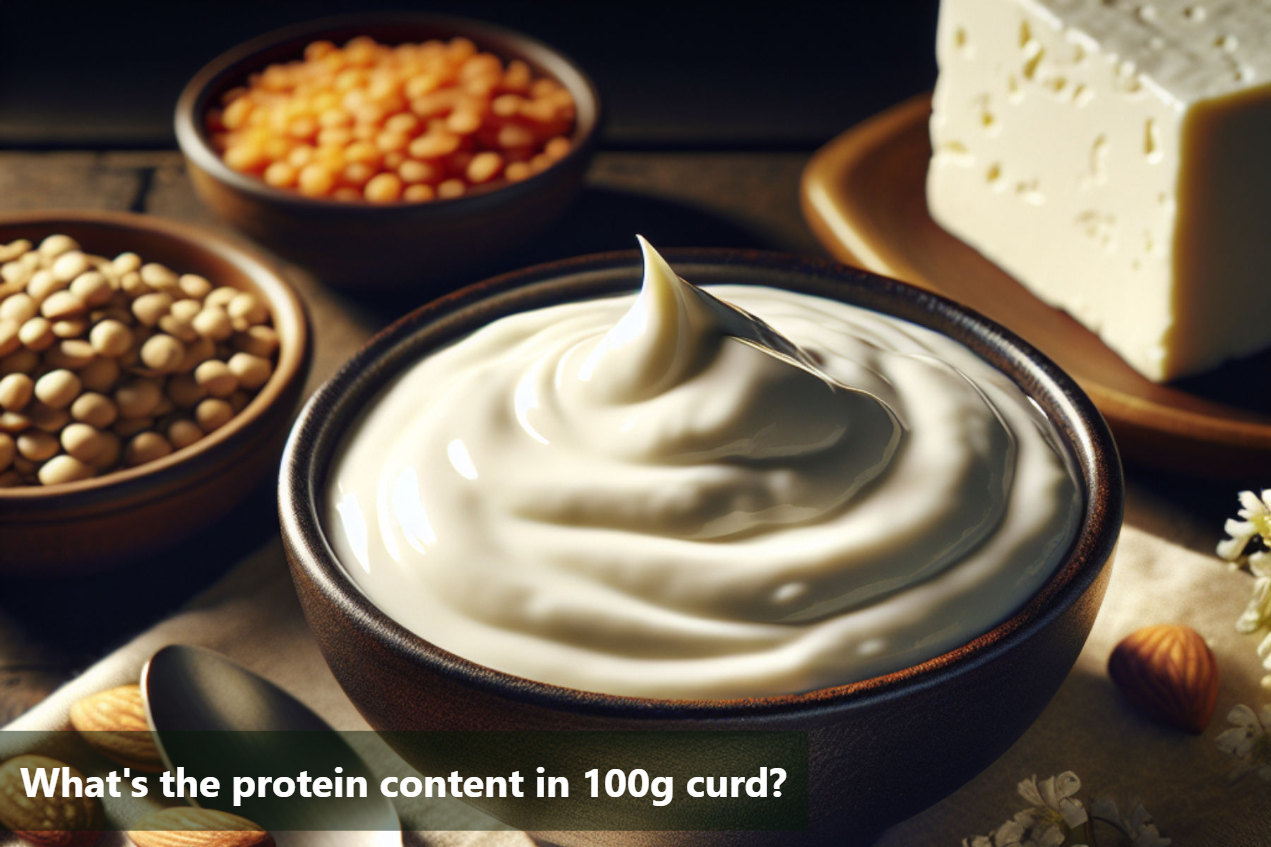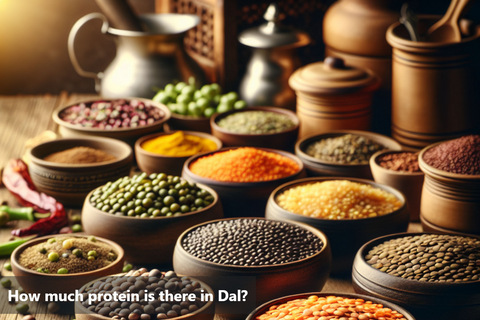
What's the protein content in 100g curd?
Curd, also known as yogurt, is a versatile dairy product enjoyed by many for its taste and numerous health benefits. It is rich in nutrients and particularly valued for its protein content. Protein is an essential macronutrient crucial for building and repairing tissues in the body.
When we talk about protein in curd, we are looking at a significant source of this essential nutrient. Consuming curd not only provides protein but also delivers beneficial bacteria that support gut health.
Knowing how much protein is present in curd enables individuals to make informed dietary choices. Whether you are focusing on muscle development, weight management, or overall well-being, incorporating curd into your daily meals can be a convenient and delicious way to meet your protein requirements.
In essence, curd serves as an excellent source of protein, offering a range of health benefits beyond its nutritional value. By being aware of the protein content in curd, you can enhance your diet and promote a healthier lifestyle.
Nutritional Composition of Curd
|
Nutrient (100 g) |
Plain |
Plain, Low Fat |
Cheese, Creamed Curd |
Greek Yogurt |
|---|---|---|---|---|
|
Calories (Cal) |
70 |
63 |
98 |
73 |
|
Carbohydrates (g) |
5.26 |
7.04 |
3.38 |
3.94 |
|
Sugar (g) |
3.96 |
7.04 |
2.67 |
3.56 |
|
Protein (g) |
3.52 |
5.25 |
11.1 |
9.95 |
|
Fat (g) |
3.52 |
1.55 |
4.3 |
1.92 |
|
Calcium (mg) |
132 |
183 |
83 |
115 |
|
Cholesterol (mg) |
15 |
6 |
17 |
10 |
Factors affecting protein content
-
Milk Quality: The quality of milk used to make curd directly impacts its protein content. Higher quality milk with more solids tends to yield curd with higher protein levels.
-
Curd Culture: The type of bacteria culture used for fermentation can influence the protein content. Different cultures may produce curd with varying protein concentrations.
-
Fermentation Time: Longer fermentation times allow bacteria to metabolize more lactose and produce more lactic acid, which can affect the protein structure and content in curd.
-
Temperature: The temperature at which curd is fermented can affect the rate of bacterial growth and protein breakdown, ultimately impacting the protein content in the final product.
-
Straining Method: Straining curd to remove whey can affect its protein concentration. Thicker curd obtained through straining may have a higher protein content compared to thinner curd.
-
Storage Conditions: Storage conditions, such as temperature and duration, can affect the stability of proteins in curd. Improper storage may lead to protein degradation over time.
-
Milk Fat Content: The fat content of the milk used to make curd can indirectly influence its protein content. Higher fat content may result in a creamier texture, but it doesn't directly affect the protein concentration.
Benefits of Consuming Protein-Rich Curd
Protein-rich curd is a valuable addition to a balanced diet, offering numerous benefits for overall health and wellness. Curd, also known as yogurt, is a versatile dairy product that is packed with essential nutrients, with protein being a standout component.
-
When it comes to muscle building, protein-rich curd plays a crucial role. The protein in curd provides the necessary building blocks for muscle repair and growth, making it an excellent post-workout snack or meal. Including curd in your diet can help support muscle recovery and development, especially when combined with a consistent exercise routine.
-
In terms of weight management, protein-rich curd can be a helpful ally. Protein is known to be satiating, helping you feel full for longer periods and potentially reducing overall calorie intake. By incorporating curd into your meals or snacks, you may curb hunger cravings and promote weight loss or maintenance goals.
-
For overall wellbeing, curd offers probiotics that support gut health and digestion. The protein content in curd contributes to a feeling of satisfaction and can help stabilize blood sugar levels.
-
Additionally, curd is a versatile ingredient that can be included in various dishes such as smoothies, parfaits, or savory dishes like raita.
To maximize the protein intake from curd, consider pairing it with nuts, seeds, or fruits for added nutrients and flavor. Including curd in breakfast, as a snack, or as a side dish can boost your protein consumption throughout the day, supporting your health and wellness goals.
Quantifying Protein: Exploring Curd's Protein Levels
Understanding the protein content in curd is vital for making informed dietary choices. Curd is a rich source of protein which plays a crucial role in muscle repair, immune function, and overall health.
By incorporating protein-rich curd into your diet, you can support muscle building and maintenance. Additionally, the protein in curd can aid in weight management by promoting satiety and supporting metabolism. This dairy product is not only delicious but also a nutritious addition to your meals.
It is important to note that protein is an essential macronutrient that should be consumed in adequate amounts daily. By including curd in your diet, you can ensure you are meeting your protein needs while enjoying its numerous health benefits. Remember to pay attention to the protein content in your food choices, including curd. Making informed decisions about your diet can contribute to a balanced and healthy lifestyle. Prioritize protein intake and enjoy the benefits of this nutrient-rich dairy product.
This Blog post is an initiative by Lo! Foods, to provide accurate and Nutritionist / Doctor approved information related to Health. Lo! Foods is India's leading brand for Everyday Functional Foods. Foods designed for specific Health conditions or Needs. Lo! Foods also runs India's largest range of Low Carb Healthy Cloud Kitchens, under the brand names of Lo!, ProteinChef, ATH (All Things Healthy) and DiabeSmart.













Leave a comment
Your email address will not be published.